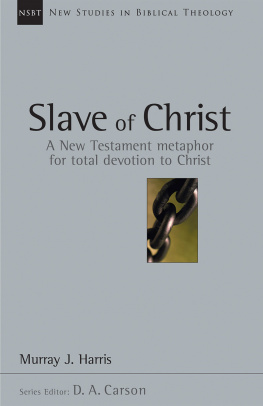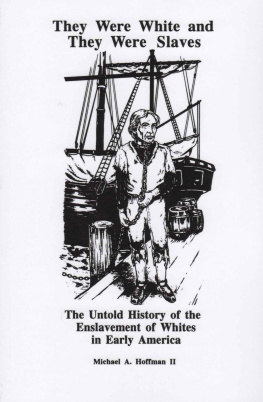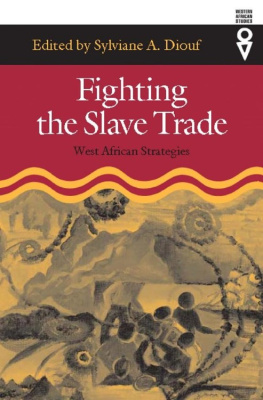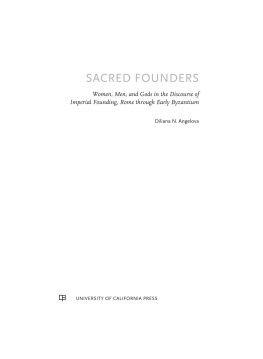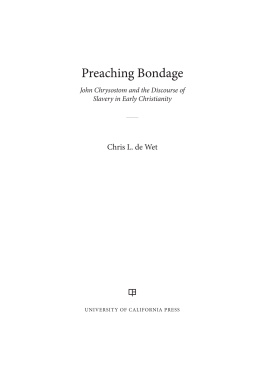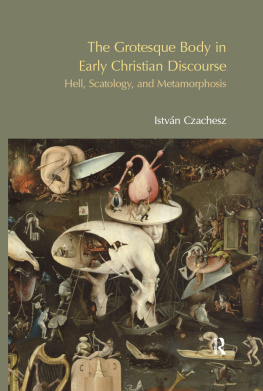
The Slave Metaphor and Gendered Enslavement in Early Christian Discourse
Kartzows The Slave Metaphor and Gendered Enslavement in Early Christian Discourse fundamentally reconfigures the way that scholars approach slavery, its attendant metaphors, and its production of gender in early Christian studies. Kartzow takes the very nature of metaphor its ability to produce multivalent meanings and situates this multiplicity into intersectional historical analysis of early Christian discourses. The result is a powerful re-working of early Christian history that foregrounds the centrality of enslavement in the creation of theologies, literature, and histories.
Katherine A. Shaner, Wake Forest University School of Divinity, USA
The Slave Metaphor and Gendered Enslavement in Early Christian Discourse adds new knowledge to the ongoing discussion of slavery in early Christian discourse. Kartzow argues that the complex tension between metaphor and social reality in early Christian discourse is undertheorized. A metaphor can be so much more than an innocent thought figure; it involves bodies, relationships, life stories, and memory in complex ways. The slavery metaphor is troubling since it makes theology of a social institution that is profoundly troubling. This study rethinks the potential meaning of the slavery metaphor in early Christian discourse by use of a variety of texts, read with a whole set of theoretical tools taken from metaphor theory and intersectional gender studies, in particular. It also takes seriously the contemporary context of modern slavery, where slavery has re-appeared as a term to name trafficking, gendered violence, and inhuman power systems.
Marianne Bjelland Kartzow is Professor of New Testament Studies at the Faculty of Theology, University of Oslo, Norway.
Routledge Studies in the Early Christian World
Routledge Studies in the Early Christian World offers monographs and edited collections, which explore the most cutting-edge research in Early Christianity. Covering all aspects of world of early Christianity, from theology, archaeology, and history, to urbanism, class, economics, and sexuality and gender, the series aims to situate these early Christians within the wider context of Late Antiquity.
Comprising both regional studies and broader thematic surveys, this series explores what changed with the advent of Christianity, what remained the same, and how early Christians interacted with, made sense of, and shaped the world around them. Aimed at early Christian scholars, classicists and historians alike, Studies in the Early Christian World is an invaluable resource for anyone researching this fascinating period.
Available:
MASCULINITIES IN THE COURT TALES OF DANIEL
Advancing Gender Studies in the Hebrew Bible
Brian Charles DiPalma
THE SLAVE METAPHOR AND GENDERED ENSLAVEMENT IN EARLY CHRISTIAN DISCOURSE
Double Trouble Embodied
Marianne Bjelland Kartzow
THE CAPTIVE MONK
Slavery and Asceticism in Early Syrian Christianity
Chris L. de Wet
Forthcoming:
SEXUALITY, CELIBACY, AND MARRIAGE AMONG THE EARLY CHRISTIANS
John Martens
www.routledge.com/Routledge-Studies-in-the-Early-Christian-World/book-series/SECW
The Slave Metaphor and Gendered Enslavement in Early Christian Discourse
Double Trouble Embodied
Marianne Bjelland Kartzow
First published 2018
by Routledge
2 Park Square, Milton Park, Abingdon, Oxon OX14 4RN
and by Routledge
711 Third Avenue, New York, NY 10017
Routledge is an imprint of the Taylor & Francis Group, an informa business
2018 Marianne Bjelland Kartzow
The right of Marianne Bjelland Kartzow to be identified as author of this work has been asserted by her in accordance with sections 77 and 78 of the Copyright, Designs and Patents Act 1988.
All rights reserved. No part of this book may be reprinted or reproduced or utilised in any form or by any electronic, mechanical, or other means, now known or hereafter invented, including photocopying and recording, or in any information storage or retrieval system, without permission in writing from the publishers.
Trademark notice: Product or corporate names may be trademarks or registered trademarks, and are used only for identification and explanation without intent to infringe.
British Library Cataloguing-in-Publication Data
A catalogue record for this book is available from the British Library
Library of Congress Cataloging-in-Publication Data
A catalog record has been requested for this book
ISBN: 978-0-8153-7465-7 (hbk)
ISBN: 978-1-351-24161-8 (ebk)
Typeset in Times New Roman
by Apex CoVantage, LLC
FOR MY TEACHERS, SUPERVISORS, MENTORS, COLLEAGUES, AND FRIENDS
TURID KARLSEN SEIM, IN MEMORY (19452016)
AND
HALVOR MOXNES
Why write a book about the slavery metaphor in early Christian texts? Because I believe that structures of injustice have deep roots and complex genealogies. I also think it is important to re-read these ancient canonical texts closely and slowly, with critical and constructive perspectives, in a context where slavery has re-appeared as a term to name trafficking, gendered violence, and inhuman power systems. Modern slavery did not come from nowhere.
The way we conceptualize is connected to how we act in the world as embodied and relational beings. I have for a long time been worried and curious when confronted with the fact that in early Christian discourse, slaves are useful to think with. Slavery metaphors work to reinscribe injustice and hierarchy, but can also help in fighting such structures. This book aims at re-conceptualizing the potential of the slavery metaphor.
When I try to remember what has been important in the process of writing this book, I see many faces and many places. I see my teachers and mentors who once upon a time encouraged me to work with troublesome or beautiful ancient texts and interdisciplinary theories of interpretation. Their creative approach to the New Testament is still of great inspiration to me. I see my close colleges with whom I have shared everyday academic life at the University of Oslo for many years. But I also see other places far away from home. The challenges discussed in this book have followed me since I lived in Berlin, Germany, where good colleges at the Humboldt University have been of special importance. Being a research fellow at the University of South Africa in Pretoria for three years also gave me great inspiration, together with engaged colleges from Johannesburg and Pietermaritzburg. Living in Northern Europe, where we have close connections between our countries, has also formed the context of this study. Good neighbors in Latvia and Estonia, who have generously invited me to attend conferences over the last years, have also been important in this process.
Also, several networks within the field have been crucial in offering broad and interdisciplinary conversations and exchange. I want to mention the




